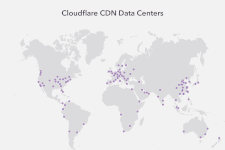CDN
Stands for "Content Delivery Network." A CDN is a group of servers distributed in different locations. Small CDNs may be located within a single country, while large CDNs are spread across data centers around the world.
CDNs are used to provide content to users in different locations as quickly as possible. For example, a user in San Francisco may receive website content from a server in Los Angeles, while a user in England may receive the same content from a server in London. This is accomplished using data replication, which stores the same data on multiple servers. Whenever you access a website hosted on a CDN, the network will intelligently provide you with the content using the server closest to the your geographical location.
By providing Internet-based content over a CDN, large businesses can avoid bottlenecks associated with serving data from a single location. It also helps limit the impact of security breaches, such as denial of service attacks. If hardware fails on one server, the CDN can quickly reroute traffic to the next best server, limiting or even eliminating downtime.
While CDNs are often used to host websites, they are commonly used to provide other types of downloadable data as well. Examples include software programs, images, videos, and streaming media. Cloud computing services are often provided over content delivery networks as well. Since CDNs automatically choose the best server for each user, there is no need to manually choose the most efficient location, like some FTP download services require.
NOTE: While CDNs are often accessed via standard URLs, many CDNs include the letters "cdn" in their web address.
 Test Your Knowledge
Test Your Knowledge